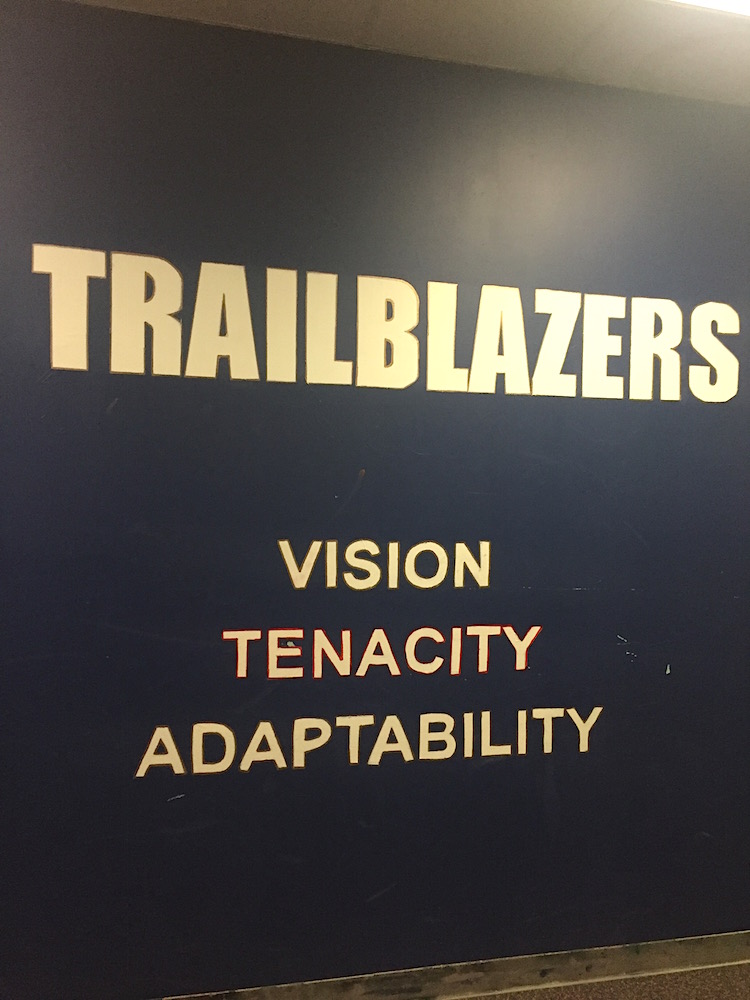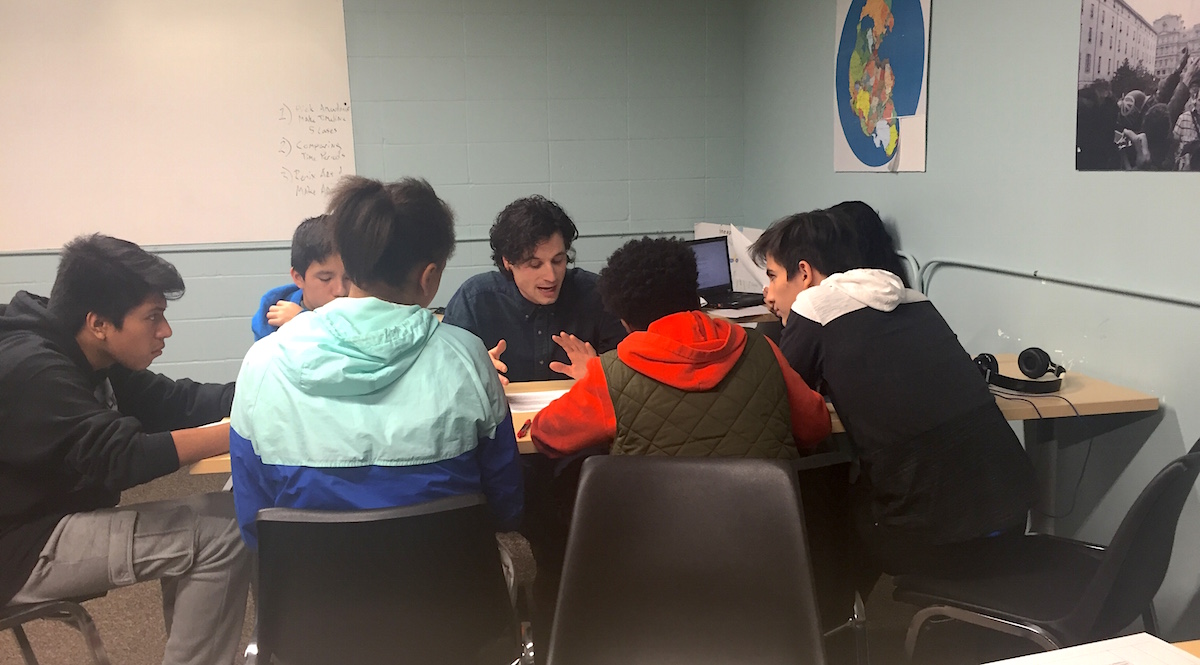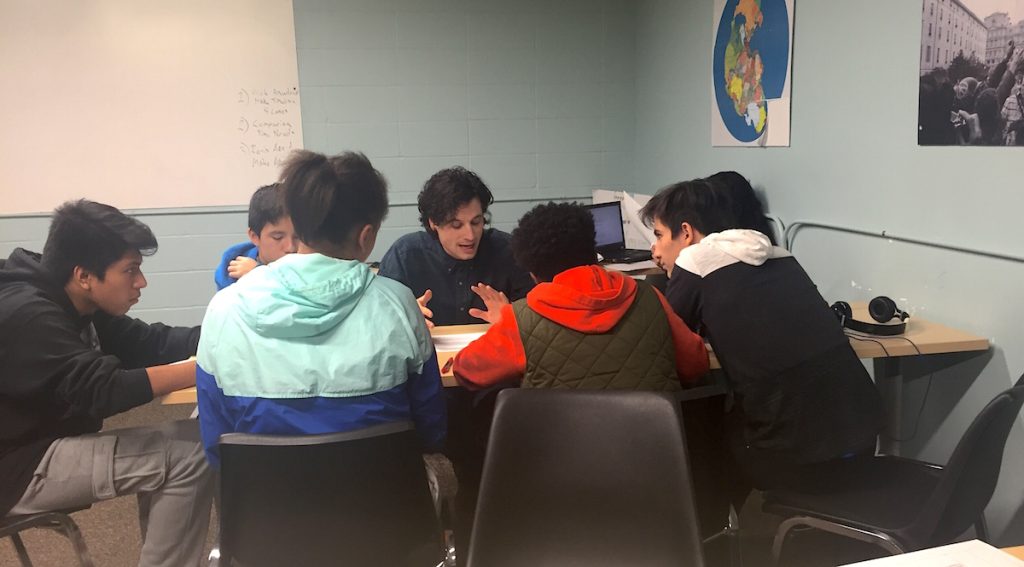Since its inception in 1998, Google has grown from two to over just 57,000 employees. In order to maintain their start-up culture and increase staff retention, Google has allowed their employees to design their own desks and workstations, in addition to creating unconventional workspaces that include bean bag chairs, couches, hammocks, and in tents. The result looks a little chaotic but, according to Google, that is how their employees like it.
Walking into Venture Academy, a Southeast Minneapolis middle and high charter school, is like walking into Google. To the outside eye, one that has been trained to look for the industrialized education model where students are supposed to sit silently at desks, it may first appear chaotic and unorganized. However, upon closer examination, it is evident that Venture is anything but that.
Google-esque Environment
In Jessica Loper’s 8th grade classroom, students are spread out around the room and working in groups or as partners. Some are in desks, while others sit on the floor or stand. And Ms. Loper? She is walking around, checking in with students and offering support when needed.
It is not the cookie cutter mold of what a classroom is “supposed” to look like; students are not confined to a desk and the teacher is not lecturing. Instead, students are driving the learning through a blended learning model that combines classroom education, online learning, and technology to create an academic environment that is student-centric. The teachers act as learning coaches, meaning they do the learning with the students instead of to them.
This classroom is not unique to the school, nor did it occur by luck. Rather, co-founders Jon Bacal, former head of Minneapolis Public Schools’ Office of New Schools, Kerry Muse, a veteran teacher of a California KIPP school, and the late Verne Johnson were intentional in the design. According to Muse, “We set out to purposefully design a system that allows kids to do things like navigate ambiguity.” As a result, Venture asserts that they are the nation’s first middle-high school whose goal is to create the next generation of innovators and entrepreneurial leaders.
Their innovative model has been recognized nationally. In 2012, before they opened, Venture was one of 20 schools nationwide to win the Next Generation Learning award, funded by the Bill and Melinda Gates Foundation, for their innovative school model. Additionally, in 2013, they were awarded a $250,000 grant from the Walton Family Foundation.

Trailblazer in Personalized Learning
Venture serves a diverse student population: 48 percent Hispanic/Latino, 33 percent African American, 11 percent Native American, 8 percent White, 92 percent low-income, 34 percent English Language Learners (ELL), and 27 percent special education. Additionally, according to Bacal, students who enroll at Venture are starting out, on average, three or four years below grade level and have had adverse experiences at other schools.
In order to accelerate learning, while also encouraging curiosity and creativity, Venture has implemented tools so that students, in every classroom, are in charge of their learning. In 2015, Venture was one of only 19 schools and the only one in the Midwest selected for the Summit Public Schools partnership. Through that partnership, every Venture students was given a computer that has their Personalized Learning Plan (PLP), a platform that was developed by Summit and Facebook.
The PLP blends online curricula with hands-on learning. Students are able to track their progress on projects and assignments, receive teacher feedback and support, take assessments, set college preparedness goals, and view their grades.
Say for example a student had chosen to do a project on social justice; they could log into the PLP software, outline milestones and tasks for their project, click on links to videos and other interactive resources suggested by teachers and other students, and see the rubric (which includes “21st-century,” i.e. cognitive skill development) against which their work would be evaluated.
The PLP also allows students move at their own pace and has created the opportunity for Venture students to reclaim ownership and regain motivation in their education. According to Muse, “Learning is hard and learning can be painful at times, but when kids break through that and they begin to see success…then you start to see this motivation improve with kids in a way that is profound.”
When a student completes an assignment or project they can move on to the next one without waiting for the rest of the class. Similarly, if a student is behind on a project or assignment, then their PLP alerts them and their teacher.
Strong student-teacher relationships have had a huge role in the success of Venture’s personalized learning. The teachers have high expectations for their students, but they also trust that they will get their work done. When students feel that trust, it activates their sense of agency and ownership of their learning.

Venture Students Win Entrepreneur Contest
Venture’s goal of creating entrepreneurs was realized last February when four Venture students won Startup Weekend EDU Twin Cities, a weekend-long contest where Minnesota adult technology entrepreneurs spent 54 hours trying to bring their startup concepts to reality.
The students beat out 10 adult teams with Raisable (formerly Students Solve), a prototype of an online fundraising platform that is designed for student-centric crowdfunding. It was such a compelling idea that they have recruited a few software developers.
When Raisable was was declared the winner, many of the students were in disbelief, “They announced third place and second place and we were like, ‘Oh well, we did a good job this weekend.’ And then they announced us.” said, Aria Denisen, a Venture student and Raisable teammate.
Innovative High School
This year Venture expanded and opened their first high school, which is housed in the same building as their middle school. The high school currently serves 70 students in 9th grade, with Bacal’s daughter being one of them, and 63 of the students attended Venture’s middle school.
There are not many chartered schools in the state that serve a 6th-12th grade continuum, but for Bacal, he thinks, “It is important for us to stick with kids through high school so we can continue to support and build off the work that was done in middle school.”
Venture High’s model is even more innovative than their middle school. In addition to the project-based and personalized learning, each Venture high school student will have an internship they go to two days a week. During the course of their internship, the students will also complete a relevant project for their organization.
According to Margaret Holland, the high school partnership coordinator, in order to prepare for the internships, students are learning several professional skills like how to do informational interviews and design resumes. Holland adds, “The goal is to make sure that every student’s internship is in an area that they are passionate about.”
Promising Early Results and Looking to the Future
In a time when reformers are trying to figure out how to close the “achievement gap,” the results from Venture’s innovative model are promising. In their first year of operation, Venture students grew 170 percent from the fall-spring NWEA-MAP test in reading and 150 percent in math. More recently, in 2015, Venture ranked second in academic growth, on the Multiple Measures Rating (MMR), out of the 23 Minneapolis public schools that serve 6th-8th grade student populations that are at least 60 percent low-income.
Venture also tracks their progress by measuring the percentage of students who receive weekly 1-on-1 mentorship check-ins with teachers, the percentage of high school students who participate in professional internships, the results of the Fall-Spring Search Institute REACH student survey, and other student, parent and teacher survey data.
In the future, Venture would like to expand. They currently have students on the waiting lists for 7th through 9th grade and, according to Bacal, having to turn away kids is tough.
With that said, they are still refining the implementation of their model and Bacal admits that they much have room to grow. However, he adds that one of Venture’s strengths is that they are a learning organization; “We have gotten better each year and retained an increasingly talented staff. We have learned together and it is critical that we are continuously learning.”
Bacal also wants Venture to be a resource for other schools. Through their partnership with Summit, they are looking at working with other schools that want to learn more about and adopt personalized learning. For Bacal, the ultimate dream is that one day the term “personalized learning” will cease to exist because that is how education for every single child will be delivered.
